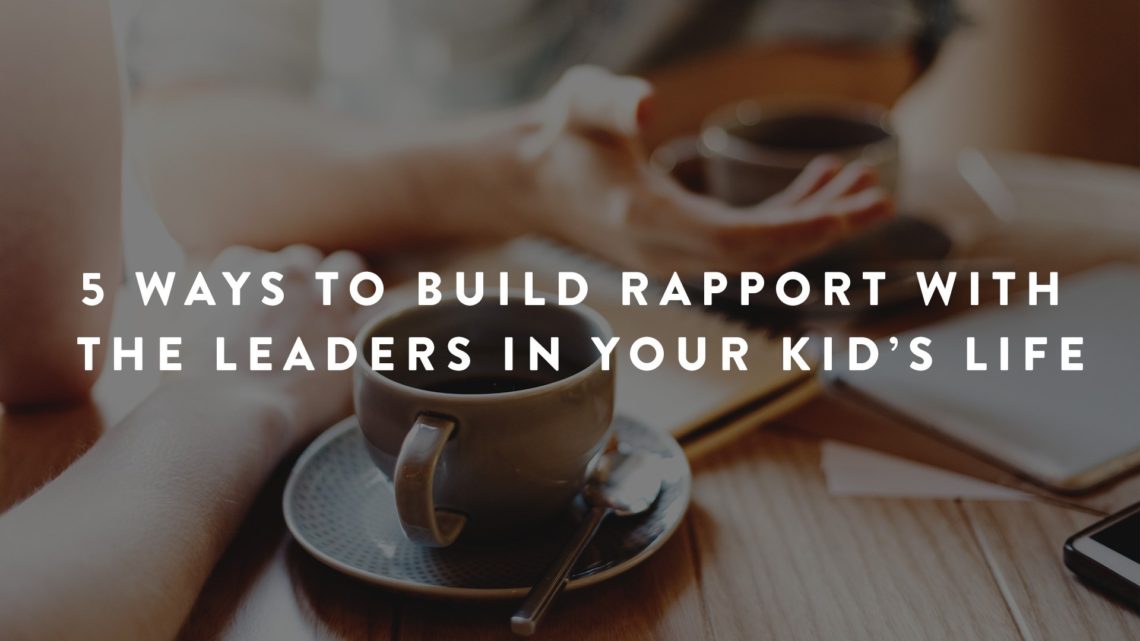
Lots of relationships in life come without a manual. How exactly do people learn to . . .
· Be a good spouse?
· A good student?
· A good parent?
· A good coffee-shop customer?
Without any instruction, you can wonder “am I doing this right?” And just like all of those, it can be hard to know how to relate to the leaders in your kid’s life. Maybe your child is in a small group at a church or in a Sunday school class. Maybe you’re thinking of a teacher or a coach.
What do you say?
Do you offer to show up?
Is that weird?
The truth is having a good relationship with your kid’s small group leader, or any leader in their life, is tricky. It will look different at every age, with every kid, and with every leader. But, as a long-time small group leader, I can tell you there are a few tricks to build rapport with your kid’s leader, ensuring that relationship is a good one.
1. Introduce yourself.
Let’s just be honest. Meeting people is awkward. None of us are good at it. And on top of that, meeting a parent can be really intimidating, especially if you aren’t a parent yourself. That’s why one of the kindest things you can do is take the pressure off by introducing yourself first. Ask for coffee. Shoot them a text.
However you do it, your kid’s leader will be grateful you made the first move.
2. Ask questions without questioning.
Not everything your kid’s small group does will make sense. If they’re little, they may come home smelling like glue and still shaking off the glitter. If they’re older, you may pick them up from camp with a bad attitude, a sleepy face, and the distinct smell of Doritos and energy drinks. So it’s natural to wonder what in the WORLD that group is doing. And good news . . . it’s okay to ask!
Most of the time your kid’s leader wishes you knew just how much is going on in your kid’s group and how they’re growing. But just like every question, tone is key. Even if you aren’t sure an activity was wise or helpful, try to ask questions about what happened and why before asking questions like, “what were you thinking?”
Even if they make mistakes, the person leading your kid’s group is pouring out a lot of their time and energy and attention because they love your kid. And that alone is a good reason to assume the best intentions, even while asking about something that doesn’t make sense.
3. Honor the relationship.
Your kid’s small group leader is not your kid’s playmate. They’re your kid’s leader. Chances are they’ve been through some training on working with kids this age. As a leader, they handle a lot of responsibility both for the physical safety and the spiritual health of a whole group of kids. And even if they’re younger than you—by a lot, even if they are just a teenager themselves—to your kid they are a trusted adult. And it’s important to talk TO them and ABOUT them that way.
In doing so, you not only build trust with the leader (after all, nobody wants to be talked down to), but you also teach your child that their leader is a trustworthy person and what they’re saying matters.
4. Say thanks.
Is there anything better than a thank-you note? Why, yes. Yes there is. It’s called a gift card. Especially as your kid gets older, their leader may be investing more than you realize in their future. Giving rides, showing up every week, taking vacation days to go to camp, and more vacation days for weekend retreats, staying up to answer late-night texts, and showing up at sporting events all come at a price.
So why not refill their (coffee, gas, emotional) tank with a thank-you note and a gift card?
5. Offer to help.
The mantra of a great small group leader is “make it happen.” But making the magic happen is far easier when someone comes alongside you to offer rides, make snacks, host an overnight, plan the service project, or organize and communicate with the other parents. If you aren’t sure what to offer, simply send your kid’s leader the list above and says something like this, “Hey, I read this article that said these were some ways to help out the leaders in your kid’s life. Would any of those be helpful to you? If so, I’m happy to jump in!” Even if the leader says they have everything covered, they will appreciate you asking.
So, what can you do this week to start building a little more rapport with the leaders who are investing in your kid’s lives week after week?





